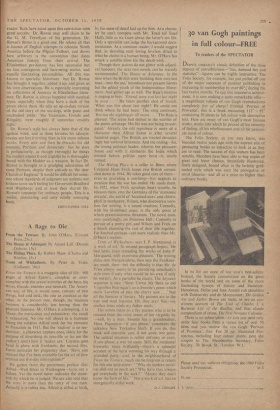A Rage to Die
Tents of Wickedness. By Peter de Vries. (Gollancz, 16s.)
Front the Terrace is a maggoty slice of life : 900 Pages of Alfred Eaton's, complete or over- complete with the sexual activities of the hero, his wives, friends, enemies and neutrals. The Ameri- can way of life, it would seem, consists of two things, bed and desk, the one as crooked as the other. In the present case, though, the business business is considerably less boring than the pleasure business. Mr. O'Hara is attempting, a in Mann, the meticulous and exhaustive : the result is exhausting. No one will object to a footnote listing the subjects Alfred took for his entrance to Princeton in 1915. But the 'realism' is so ten- dentious: a character appears once, sblely for the purpose of describing its love-life or (to use the author's term) how it 'makes sex.' Coyness goes hand in glove with frankness; the second Mrs. Eaton intimates her pregnancy thus: 'Have you noticed that I've been available for the art of love without any five-day interruptions?'
We gather from the portentous preface that Alfred--Wall Street to Washington—turns out a failure. Yet the novel never indicates the stand- ards by which he is judged. We are also told that the story is more than the story of one man. Actually it is rather less. Alfred is stifled at birth, by the mass of detail laid up for him. As a charac- ter he can't compete with Mr. Toad (of Toad Hall), little as we know about the latter's sex life. Only a specialist can judge the background docu- mentation. As a common reader, I would suggest that, in devoting such loving loveless detail to what he claims is a human being, Mr. O'Hara has struck a notable blow for the death-wish.
Though their jackets do not glitter with adjecti- val honours. the next two novels can be warmly recommended. The House at Adampur, in the time when the British were 'building their own last road—into the sea,' introduces not peasant heroes but the gilded youth of the Independence Move- ment. And gilded age as well. The Raja's mistress is singing to him : *Friend, were you lost last night in sleep . . He takes another shot of Scotch. 'What was this about last night? He could not think where he had been.' The song continues, 'But not the nightingale till morn The Raja is pleased. 'The scene had shifted to the warbler of the poetic arborage. His life was not being investi- gated.' Already the old reprobate is more of a character than Alfred Eaton is after several hundred pages. The British are treated devastat- ingly but without bitterness. And the ending—Jai, the young political leader, inherits the pleasure- house and with it reinherits the India which existed before politics were born--is neatly turned.
The Hiding Plum is a cellar in Bonn where Corporal Hans Frick keeps two British airmen, shot down in 1944. He takes good care of them— even to providing a sun-lamp—but neglects to mention that the war has ended. He needs them. In 1952, when Frick develops heart trouble, he releases them, into the Germany of the 'economic miracle', the world of 'localised wars' and chloro- phyll in toothpaste. Wilson, who discovers a voca- tion for writing, is a sound creation; Connolly, with his ill-defined angst, is the only point at which pretentiousness threatens. The novel ends, very satisfyingly. on Primrose Hill : Connolly in pursuit of a pretty girl, and Wilson and Frick on a bench planning the rest of their life together. -Far-fetched perhaps—yet more realistic than Mr. O'Hara's realism.
Tents of Wickedness, says J. P. Marquand. is 'a work of art.' Its second paragraph begins, He had lately been rereading the works of John P. Marquand, with enormous pleasure.' The writing slides into NI arquanderie, then into the Faulkner- ian mode, then—hut the difficulty is that Mr. de Vries always seems to be parodying somebody's style even if only what would be his own if only he weren't. As a parodist he excels. The Joycean sequence is nice ('Sister Carrie Me Back to old Virginibus Puerisquel. so is Sweetie's poem which
starts 'Loveliest of pies, the cherry now . . Not all the humour is literary. 'My parents are in the iron and steel business. Oh, they are? Yes--my mother irons while my father steals.'.
The action turns on a fey poetess who is to be rescued from the ivory tower of her virginity by --well, by a man.. Sweetie has a grandmother, Mme. Piquepuss—'if you please,' comments the talkative New Yorkative blurb. If you do, this book will convulse you; if not quite, not quite. The central situation is rather unfunny or even, if you please, a wee bit nasty. Still, the incidental fireworks blaze brilliantly—there's. a splendid account of the hero worming his way through a crowded party--and, in the neighbourhood of From the Terrace, much can be forgiven in return for this one quip alone : "Why do modern novel- ists dish out so much sex? Why have they always got everybody in the sack?" "Maybe they don't know the facts of life." ' Not a work of art, but an energetically artful work.
0..1. LNRIGHT






































 Previous page
Previous page